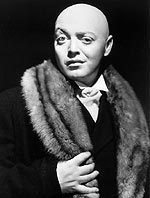 | Without wishing to turn this into a pastiche instalment of Jim Jarmusch's Coffee and Cigarettes series, with the likes of Iggy Pop and Tom Waits, or to turn into a walking advertisement for tobacco companies, I can't deny that certain tastes and sights still possess a compelling aura about them. For instance? Coffee coffee coffee… strong and intense, black and brewed in a stovetop espresso machine, the way it should be. The way of all addictions. I'll leave opium eating to De Quincey, though, and absinthe to the French Symbolists. Bach, it would appear, had his own need for a caffeine fix, which led him to compose the Coffee Cantata- he doesn't betray details of his passion, unfortunately, but I'm sure he drank his in suitably balanced proportions, as would befit a composer of his standing in 18th century Leipzig. Cigarettes, nicotine, ash and stubs, lighter fuel sparking against stone, the cigarette end burning to life. The best warning about the dangers of cigarette smoking is surely Peggy Lee's version of 'Don't Smoke in Bed'. Seeing Stephin Merritt perform live recently gave me more food for thought. Waving his Lucky Strikes like a magic wand, or a lasso in 'Papa Was a Rodeo', or viewing the logos which emblazon a Ferrari or a McLaren, I can see how the activity still has its passionate advocates and a tenacious ability to grip the unconscious. The myth can still spark nocturnal infatuations. Alain Delon in Le Samourai, or Robert Mitchum urging the fates to build his gallows high, James Mason the suave double agent Cicero in Mankiewicz's riveting Five Fingers. There isn't room in my life for more than one unhealthy fascination, so I leave my addiction to be lived vicariously, by celluloid movers and hip kings and queens of the silver screen. None more ambivalently, or more threateningly, so than Peter Lorre, in such exquisite scenarios of the unconscious as The Beast With Five Fingers. One of the most entertaining film-related books is Luis Bunuel's hilarious autobiography My Last Breath- with appropriate dryness, he sheds light on mixing Martinis in high surrealist fashion and Dali's bizarre sexual habits (or rather lack of them- he certainly found intriguing, and disturbingly chaste, uses for a fried egg). In it he also expresses his horror at stumbling across Peter Lorre's extravagant performance, orchestrating the bizarre movements of a severed hand in an Italian village to the strains of the most overblown Bach orchestration this side of Leopold Stokowski. The idea for the hallucinatory hand was Bunuel's own, of course, but had been adjudged as too outlandish by squeamish producers. Like a bad dream, he had forgotten the idea- only to be cruelly awoken by seeing it used unacknowledged in the film after all. |
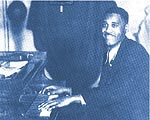 | Lorre was surely one of the strangest, and most chameleon-like, character actors to grace the screen. From beginnings in Brecht's theatre, to Fritz Lang's archetypal probing of the murderer's mind in M, a tour de force built around the letter 'M' which follows the guilty party around like a living signature, I still find his range of ability mesmerizing. Given the limited type of role he'd be granted, it's amazing how much genuine talent seeps through even a journeyman scene. The way he smokes a cigarette, peering quizzically at Bogart in The Maltese Falcon, ensures that he remains centre of attention even when merely playing second fiddle to the lead players. The finest description I've come across of his technique is in Graham Greene's film writings, still a great source of inspiration, reviews written almost as afterthoughts while he was composing such works as Brighton Rock or The Heart of the Matter I expect. But who else could see and describe Lorre's plasticine features as Dr. Gogol, grafting the severed hands of a murderer onto those of a pianist in Mad Love, in these terms: 'Those marbly pupils in the pasty spherical face are like the eye, pieces of a microscope through which you can see laid flat on the slide the entangled mind of a man: love and lust, nobility and perversity, hatred of itself and despair jumping out at you from the jelly'. Who better to imbue him with characteristics that would mark him out as a prime contender for a lead role in a film of one of his novels? Unfortunately the powers that be would never have sanctioned such a scenario. All that remains of such a tantalizing prospect is Lorre's part in the flawed version of Greene's The Confidential Agent. In my mind's eye, of course, the protean Hungarian shapes up in a version of A Burnt-Out Case rather than countless Corman horror films with Vincent Price and Boris Karloff. Lorre on screen is pure melancholia, typified by the poignant The Face Behind the Mask, which does communicate the obsession with disfigurement and self-loathing you find in A Burnt-Out Case and the disturbingly raw songs Percy Mayfield wrote after his devastating road accident. The original line-up of the Inkspots made genuinely eerie music, intense close harmonies along the lines of the later work of The Impressions, featuring the young Curtis Mayfield, whose output is documented so comprehensively by Kent records. I'd go as far to say that at times they merge the passionate outpourings of Curtis with the austere high definition blues poetry of Percy Mayfield. Their 'That Cat is High' deflates the hipster floating on his drug-induced cloud. The eerily schizophrenic 'We Three (My Echo, My Shadow and Me' is the ideal accompaniment to a lazy afternoon reading Budd Schulberg's The Disenchanted. Its hero, modelled on F. Scott Fitzgerald, is enslaved to writing a trashy musical Love On Ice, which later gave Momus a song title about Torvill and Dean. Strangely, these mischievous angels also sing of Peter Lorre and coffee in the same breath: |
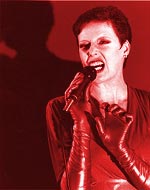 | ' I love Java sweet and hot/ Whoops Mr Moto I'm a coffee-pot/ Shoot me the pot and I'll pour me a shot'. They deliver a version of 'In the Evening' by Leroy Carr as astringent and hopeless as Carr's original, or Karen Dalton's parched sempiternal (re)vision of it. Carr and Scrapper Blackwell together produced some haunting textbook blues originals, real blueprints for later talents to expand upon and stretch out. Blueprint sums up the effect of laconic concision and heartfelt intensity which feeds into 'How Long Blues' for example- I can't think of many examples of a tune which leaps out at you to personify what a Song is capable of communicating. So much so that LeRoi Jones quotes from it in his Blues People as an example of song writing rooted in everyday feelings of loss, desolation and the disenfranchisement of negro slave-workers: 'How long has that evening train been gone/ Heard that whistle blowing, couldn't see no train/ Way down in my heart I had an aching pain'. There's something so primal and atavistic in hearing Carr's yearning tones speaking of the impossible distance between himself and his beloved. By now it's become a small obsession in itself tracking down some of the versions canned over the years. From Tim Hardin's thrilling miniature which introduced me to it, to Fred Neil's extended riffing, Leadbelly whooping and hollering with Sonny Terry's harmonica, to the Genius Ray Charles's endearingly low-key expansive effort with Milt Jackson's vibes or Jimmy 'the Spoon' Witherspoon's soaring live version. It's amazing how such a simple template can condense and dramatize everyday moments of love and loss. I agree with Alistair's assessment of Momus's opening track on Hyacinth Thistles. I also listened open-mouthed and was reduced to tears by the perfect sadness of it. Surely this is Merritt's delicious response to Jacques Brel's 'Ne Me Quitte Pas', which has its own starkly understated version by Momus on an early EP of Brel covers. Hopefully people will stop taking refuge behind accusations of post-modern irony and cynicism and take their ears out onto the battleground of pure POP poetry. Out of the shadows love's easy tears flow again. How long, how long… Lorre has been poorly served in songs though- anyone remember 'The Year of the Cat' by Al Stewart? I'm afraid I'm old enough to, with its anaemic attempt at capturing some of the skulking noir spirit of Lorre, a blank face in a threatening crowd. No, the best crowds and power song has to be Magazine's 'Shot by Both Sides': 'I wormed my way into the heart of the crowd/ I was shocked to find what was allowed/ I didn't lose myself in the crowd'. |
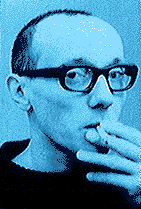
|
Devoto's albino-eyed, keyed-up, knee-jerk murderous gaze, fuelled by Dostoevsky and Roquentin's black snake nausea, has a compelling analogue in Lorre, who also happened to play the murderer Raskolnikov in Josef von Sternberg's version of Crime and Punishment. It's a crying shame Devoto, clearly The Most Important Man Alive, to borrow Momus's description, isn't recording his musical visions for posterity to sit alongside his Proustian reminiscences being recorded for the National Sound Archive. I can't think of anyone better equipped to pull off a post-punk post-Foucault set of reminiscences, unless it be Momus himself. The last major attempt at filming the whole of Proust rather than a section of his cathedral was the Losey-Pinter collaboration. It promised great things, but foundered after the French government vetoed the production on the grounds that the English reworking by Pinter damaged the integrity of the original French cultural artefact! I have to retract slightly my unequivocal position against Dylan elsewhere, after discovering Devoto's cover of Dylan's 'She's Your Lover Now'. Proof that Devoto didn't relinquish his talents with Luxuria, dreaming up album titles like Beast Box (a nod there towards The Beast With Five Fingers or Momus's The Beast With No Backs?), the song is on the b-side of the towering 12' of 'Redneck'. Testament to the man's talent with a vitriolic lyric, 'pain brings out the best in people, doesn't it?', and delivered in two parts, the song beats Dylan's own version for sheer brazen energy and snarling paranoiac convulsions. The light pours out of Devoto, as he stubs out the final cigarette on a faded romance. The trainspotter inside me also notes it's the second song I know of to refer to strongman Charles Atlas, after Josef K's 'Sorry For Laughing'. Anyone know any others? Jazz couples aren't such a rare commodity, despite images of gunslinging birds and drug-addled hipster lifestyles. There's Carla Bley and Steve Swallow, Cleo Laine and John Dankworth, Abbey Lincoln and Max Roach, and Mike and Kate Westbrook. Kate's smoky vocals and wide linguistic range are never less than exciting, her cabaret-influenced pyrotechnics being used to full effect on her Goodbye Peter Lorre lp, with songs performed in four languages. Thankfully there's no concession to the slushiness which sometimes afflicts this sort of recording, Louis 'Pops' Armstrong's 'Mack the Knife' or Ute Lemper's designer angst. The way she spits out scenarios of alienation and hard-bitten ultimatums deserve to rank alongside Lotte Lenya, or Teresa Stratas's more polished interpretations of Weill. Imaginatively stepping into Peter Lorre's plain white Mr Moto suit and spectacles, she delivers a set of pieces that are steeped in Expressionism and express the pain of enforced compromise that burdened Lorre in Hollywood. The centrepiece is 'If Brecht Could See Me Now', which reworks a 40's standard with an extra layer of introspective analysis as Lorre ponders the geographical and ethical distance between his type-cast Hollywood self and Brecht riding high on post-war European adulation. Her purring 'I'm Peter Lorre now/ Master of Menace' gets across the mixture of innocence and wide-eyed threat which was Lorre's stock-in-trade in films like The Mask of Dimitrios from the Eric Ambler novel. The song begs the question 'who was Peter Lorre?', probing behind the theatrical mask to slyly insistent effect. Brecht wasn't averse to claiming all the glory for writing plays which were mostly the work of his wife, however, and the song cleverly ends on a note of ambiguity, the distance between them being a necessary and existential one. Westbrook also gives Cole Porter's 'Love For Sale' a much-needed revamping: even Vic Godard's version lets the first verse slink by almost unnoticed, while her more emphatic delivery teases out more mileage from Porter's inspired words: |
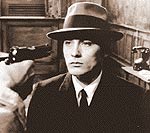 | 'When the only sound in the empty street/ Is the heavy tread of the heavy feet/ That belong to a lonesome cop,/ I open shop'. While the city sleeps- what better scenario for a Fritz Lang film noir, Lorre's gardenia-scented eccentric hovers around the shop-window. The underground man emerges from under the floorboards. © Marino Guida 2000 |